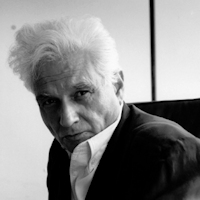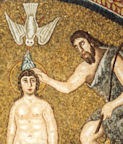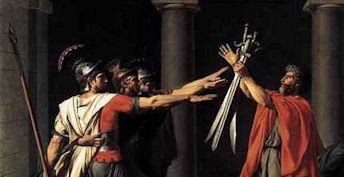il n'ya a pas de hors texte…[1]
Summarizing Derrida's deconstructive project would be a colossal task. Because of its very nature, there is no short, clear exposition of deconstruction. However, for our purposes we will focus on only a couple of its concepts, gleaning insights from a few key texts. The first of these, perhaps the most famous axiom of postmodern thought: there is nothing outside of the text.
 Derrida suggests that no text is an island in which the author's original intention can be counted on as an absolute basis for understanding meaning. Thus his axiom has often been misconstrued as a comment that would sink us into an ocean of indeterminate relativity.
Derrida suggests that no text is an island in which the author's original intention can be counted on as an absolute basis for understanding meaning. Thus his axiom has often been misconstrued as a comment that would sink us into an ocean of indeterminate relativity.
However, when Derrida first formulated this thought in On Grammatology, he actually meant something quite different. As he later clarified, the meaning of a text must be situated within a context that includes competence in the language of the text including its grammar and vocabulary as used in the epoch in which it was written, rhetorical uses of the language, the history of the language itself, and knowledge of the history of the society in which the language is/was used. In addition, the interpreter should also have familiarity with the corpus of the author.[2]
Taken together, these are the "text" which we are called to interpret – a task only possible if the writer and the reader share "a more or less anonymous tradition of code, a heritage, a reservoir of arguments" from which to draw meaning.[3]
A second key concept for our discussion of Eucharistic practice is the idea of (un)translatability. As we've previously seen, there are many barriers to the transmission of meaning even between two people who share a common language. But this effect is compounded when a translation is made from one language to another, thus bringing into play a second set of related grammar and vocabulary, cultural references, and web of meaning in which the target translation resides.
Derrida points out that "no single word, out of context, can by itself ever translate another word perfectly."[4] He is optimistic that a commentary could provide explanation of every nuance and possible meaning of a word, explaining intention, meaning, denotation, connotation, and semantic overdeterminations, but a translation requires economy, meaning there is always a balance between length and adequate transmission of meaning.[5] Without taking both parts into consideration, it would be easy to produce an exhaustive explanation of a text, but at the expense of producing a new, untenably long text that, lest we forget, still requires an intimate knowledge of all the matters discussed above in the nature of what makes a context.
Thus Derrida turns to the second element of translation: "[it] must be quantitatively equivalent to the original, apart from any paraphrase, explication, explicitation, analysis, and the like."[6] From this need for economy, we arrive at the concept of (un)translatability: nothing is translatable/nothing is untranslatable. Generally we try for a "one word by one word" sort of translation, not literally word-to-word or word-for-word, but an attempt to convey meaning in such a way as to respect verbal quantity while at the same time conveying meaning or concept.[7]
However, in limiting our quantitative space, we assume the risk that an inexpert translation can introduce new meanings not found in the original text or lose a meaning that does not translate to the target language. While the modern professional translator attempts to minimize these occurrences – providing translator's footnotes where absolutely necessary or, perhaps, including limited citations of the original language that indicate that the translation may be questionable – this has not always been the case.
An example of the potential negative side effects of translation is clearly seen in an example not wholly unrelated to our current subject: Tertullian's Latin translation of the Greek musterion. Before its first appearances in the Pauline corpus and the Markan gospel, this word was commonly used in pagan mystery cults to refer to secret knowledge imparted to the initiated, but hidden from outsiders. This sense is generally carried on in the New Testament, where the mysteries of God are hidden from the unbeliever, but are made clear to the godly.

However, during the fourth century, musterion took on new connotations, associating it not only with the scriptures, but also with the Christian cult in general, and specific acts such as Baptism and Eucharist – the mysteries of the Church.[8]
So far what we have is a linguistic trace that illustrates the drift of meaning within a single language. Now we move to the attempt at translation.
In the Western tradition, Tertullian is credited with the transition from the Greek musterion to the Latin sacramentum, from which we receive the term sacrament. Unlike the Greek source word, sacramentum lacks the original connotations associated with religious revelations. In its usage in Tertullian's time, sacramentum carried legal connotations associated with funds laid out as surety in a legal case, along with an oath sworn.
Further, the sacramenta militiae (literally, "military sacraments") were used with new recruits to the army. Soldiers swore an oath of allegiance, received a mark (such as a tattoo or a brand) and a new name.

While none of these additional legal connotations were found in musterion, they are nonetheless carried forward in the Western tradition as part of the unintended effects of translation. It is with this in mind that we turn to the texts that have played the vital role in the Eucharistic site, pointing toward the event of the death and resurrection of Christ.
[1] Jacques Derrida, Limited Inc (Evanston, IL: Northwestern University Press, 1988). 144.
[2] Ibid., 36.
[3] Ibid., 52.
[4] Jacques Derrida, "What Is a 'Relevant' Translation?," Critical Inquiry 27, no. 2 (2001): 178-79.
[5] Ibid., 179.
[6] Ibid., 181.
[7] Jean-Yves Lacoste, Encyclopedia of Christian Theology (New York: Routledge, 2005). 1408-09.
[8] Edward Foley, From Age to Age: How Christians Celebrated the Eucharist, Revised and expanded ed. (Collegeville: Liturgical Press, 2008). 74.





[…] https://www.brycerich.com/2011/02/there-is-nothing-outside-of-the-text.html [03.10.2017] […]